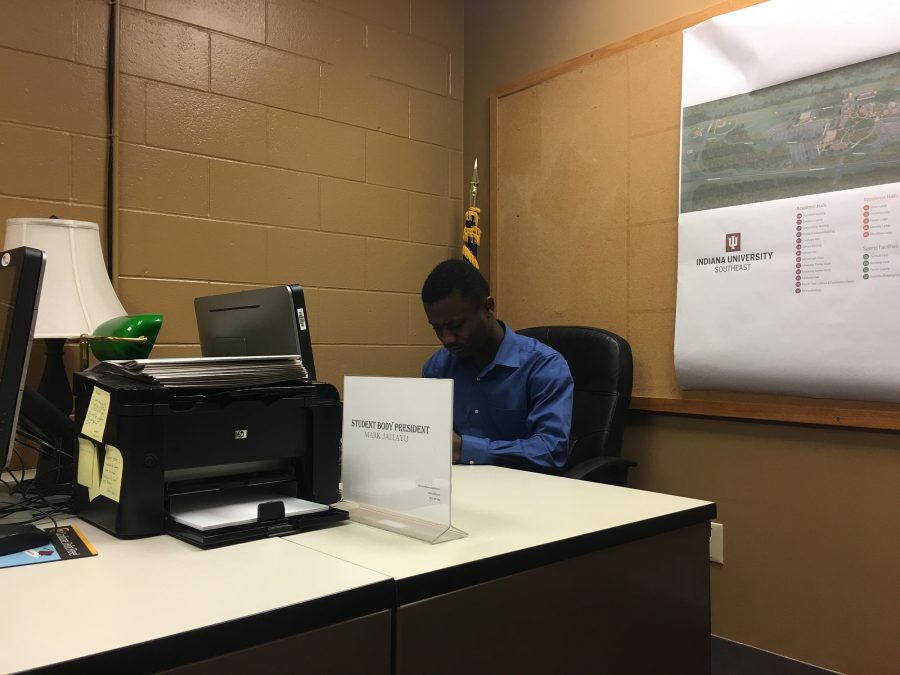An International Student’s Hope for a Better Education
Mark Jallayu, political science junior, said that he thinks many Liberians were displaced after the civil war and moved to the United States. “I came to America because my country wasn’t providing me with a good education,” Jallayu said.
April 9, 2017
IU Southeast educates many different students from all over the world. The life of a student can already be a challenging and rewarding process when the student is in their home country, let alone, from another part of the world.
According to the Pew Research Center, In the year 2013 there were 1.8 million African immigrants living in the United States. Of those, he top five countries of origin for African immigrants to the United States are Nigeria, Ethiopia, Egypt, Ghana, Kenya and South Africa.
The Story of an International Student
Mark Jallayu, political science junior and SGA president, is from Liberia. Although he said he does not know the reason for the high rate of African immigration, he said he thinks one of the reasons may be conflicts in their home countries.
“For example, my country[‘s] 14 years of civil war finally ended in 2003,” Jallayu said. “Based on estimates, some millions of Liberians were displaced. Today, many Liberians can be found in Minnesota, Philadelphia, Rhode Island, and Tucson, among others.”
Jallayu said Louisville itself is home to a lot of refugees.
“My high school was of mostly immigrants, many of them Africans,” Jallayu said. “Perhaps it has to do with the conflicts that have been going on.”
Speaking on Pew Research Center research, Jallayu said the result of the 1980 Refugee Act may have made it easier for those fleeing conflict-ridden areas, such as Somalia and Ethiopia, to resettle in the U.S.
Jallayu said the reason he decided to come to the U.S. was to get a better education.
“I came to America because my country wasn’t providing me with a good education,” Jallayu said. “Additionally, my mom and dad were paying for me to go to school in a system that is broken, that my siblings were not even able to go to school.”
Jallayu said going to school wasn’t even a possibility for him after completing secondary school because Liberia lacked community colleges and universities. He said that even after his years in school he could still potentially find himself breaking rocks, selling cold water or selling kerosene to assist his family.
According to Jallayu, his grandfather would say he was going to be president one day, and his parents had big hopes for him. That’s when Jallayu said it was decided he would get his education in the United States.
Although Jallayu said he thinks people come to study in the U.S. to further their education, he said they sometimes forget why they came in the first place.
“I’d like to think that most people come for the same reasons, however, I’ve come to learn that some people forget their roots and forget their education,” Jallayu said. “That is not to say that many people are not serious about their education, in fact, that is the very reason they come here or their parents make them come. Yet, some forget that very reason.”
The number of International Students in America
According to The Student and Exchange Visitor Program (SEVP), there were 51,584 international students from Africa studying in the United States in March 2016, which was a 4.9 percent increase from March 2015.
According to the Open Doors report by the Institute of International Education, between 2015 to 2016 there were 1,043,839 international students studying at colleges and universities in the U.S.
Where do United States Students go?
When looking at how many students study abroad in the United States, there are locations that American students choose the most.According to the National Association of Foreign Student Affairs, Europe, Latin America and Asia were the top three regions students from the U.S. studied abroad in 2014 and 2015. Africa was sixth of the eight regions listed, with 3.4 percent of American students studying abroad there.
What is the Motivation of an International Student coming to the United States?
Seuth Chaleunphonh, dean of Student Life and Student Diversity Advocate, said he thinks students want to study abroad in the United States because they are known worldwide for their excellence in research, ability to be innovative and to provide opportunities for capitalistic ventures.
“Many [international students] come to America to stay after they graduate, while others want to bring back what they learn to be in a leadership role in their country or local community,” Chaleunphonh said.
Chaleunphonh said that not all students come directly to IU Southeast from out of the country, some are transfer students from U of L and JCTC.
Jallayu said he felt that some international students who come to the U.S. forget about their roots. He said this may be due to being immersed into another culture.
If you are an international student or would like more information on IU Southeast’s international student program works, visit the international student page on IU Southeast’s website.












